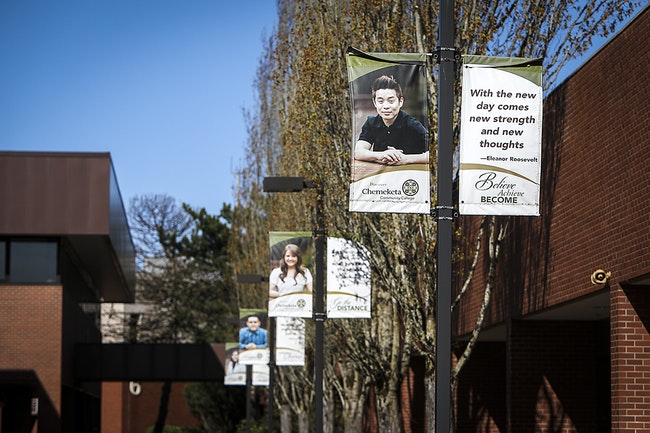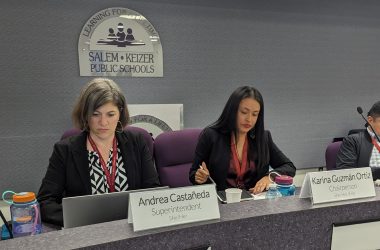Chemeketa Community College leaders are planning for substantial cuts to the college’s budget in 2023 as federal Covid relief funding runs out and student enrollment remains well below pre-pandemic levels.
Faculty at the college’s Wednesday Board of Education meeting urged the college leaders to look for cuts in administrator and overhead costs first, saying jobs for instructors and others interacting directly with students have already been cut substantially in recent years, impeding the college’s ability to attract, retain and support its students.
The college expects an $8.7 million budget deficit for the 2023-24 school year, according to a Oct. 28 budget presentation from Chief Financial Officer Aaron Hunter. Balancing that budget would require cutting college general fund expenses about 8.2%.
College leaders are asking departments to identify cuts of 15%, deeper than they expect will be needed, so they have options for crafting a balanced budget, Hunter said.
Speaking Wednesday before the Board of Education, college instructors said many of the college’s departments are already operating at bare-bones levels.
Traci Hodgson, the social sciences chair for the college, said the number of full-time faculty in social science programs has declined by about 25% in recent years.
“Faculty members retire and they’re not replaced. Soon after, student enrollment in the affected courses drop,” she said. “While the college saves money short term by not replacing these retirees, long-term we lose.”
Following a retirement last year, the college no longer has a full-time economics instructor, Hodgson said. Since then, two or three part-time faculty teach economics, and student enrollment has “plummeted,” she said. Some courses are instructed by non-economics faculty, and nobody is ensuring courses are up to date or communicating with faculty at other colleges about best practices for teaching economics.
A petition signed by 147 college faculty cited a 2021 report to the legislature from the Higher Education Coordinating Commission which found the college had 97 full-time administrator and management positions, one for every 6.8 full-time faculty or classified jobs, a substantially higher ratio of administrators than other community colleges in Oregon.
The report is based on staffing data from the 2018-19 school year.
Hunter’s budget presentation also showed the total number of exempt employees at Chemeketa has increased slightly since the 2011-12 school year, while faculty have declined by about 5%, and classified employees by 12%. Student enrollment has declined by about half over the same period.
“We believe that the students at Chemeketa ultimately pay for the unbalanced administrative overhead that our budget is forced to support through a variety of hidden costs,” said Chris Nord, vice president of the Chemeketa Faculty Association, at the meeting.
The faculty petition asked the board to “direct the College to forebear execution of any retrenchments or reductions in force within the faculty bargaining unit until sufficient reductions in force have been made within the College’s administration to bring said ratio into parity with our comparator colleges.”
College president Jessica Howard told Salem Reporter she doesn’t think the 2021 report is an accurate picture of the college’s staffing ratios because it’s based on data several years old, though she didn’t have more current figures.
She said the administrative figure for Chemeketa includes people supporting administrators, not only supervisors.
“It’s very very difficult to compare the categories of employees from community college to community college because we categorize people differently,” Howard told Salem Reporter.
She said the number also reflects the college’s grants office, which has secured a number of grants in recent years. Grants typically require somebody to administer them as a condition of receiving money.
The college, like most community colleges in Oregon, saw a large drop in enrollment in 2020 as classes shifted online and many students withdrew.
That’s on top of a decade of declining enrollment at Chemeketa and other Oregon community colleges which administrators say is due to an unusually long period of economic growth and low unemployment.
Last school year, Chemeketa had 6,900 full-time equivalent students, half of what it was a decade ago, Hunter said.
College enrollment is up 1-2% this fall, Hunter said, but remains well below pre-Covid levels. Federal Covid relief money offset the losses from lower enrollment over the past two years, but that money is expiring.
State funds for community colleges are based on full-time student enrollment, so fewer students also means less state money in addition to less tuition revenue.
Howard and Hunter said that’s forcing them to make deep cuts they’ve been able to hold off on for several years.
“Now some of those difficult decisions are needing to be made,” Hunter said in an interview.
Since January, Chemeketa has had a hiring “chill”, Howard said, meaning employees who retire or resign are generally not replaced. College leaders would prefer to reduce employee numbers through attrition than have to lay people off, she said.
“Some positions have been filled because there was simply no other way,” she said. Bringing back a full-time economics instructor is high on the college’s priority list, she said, once budget reductions are no longer needed.
In October, the college had 196 faculty – eight fewer than in January, according to data Hunter provided to Salem Reporter. About 6% of all budgeted faculty positions were vacant, and 9.5% of all college positions.
The college typically adopts a budget in late spring, though faculty being laid off must be notified by Jan. 31.
This article was updated to clarify that the Jan. 31 layoff notification date applies to faculty.
Contact reporter Rachel Alexander: [email protected] or 503-575-1241.
JUST THE FACTS, FOR SALEM – We report on your community with care and depth, fairness and accuracy. Get local news that matters to you. Subscribe to Salem Reporter. Click I want to subscribe!

Rachel Alexander is Salem Reporter’s managing editor. She joined Salem Reporter when it was founded in 2018 and covers city news, education, nonprofits and a little bit of everything else. She’s been a journalist in Oregon and Washington for a decade. Outside of work, she’s a skater and board member with Salem’s Cherry City Roller Derby and can often be found with her nose buried in a book.









